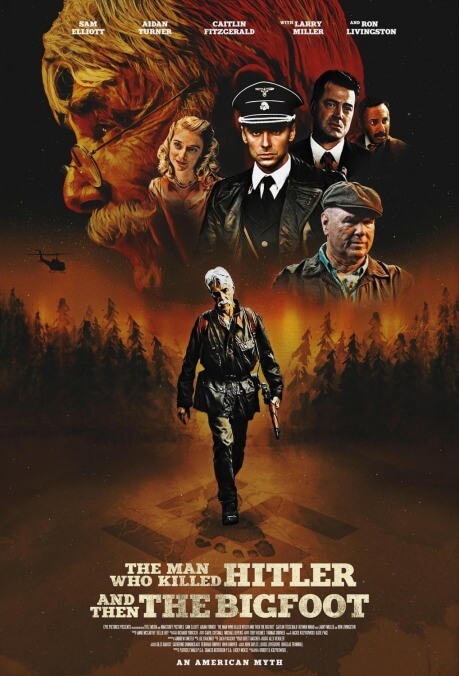Should a movie called The Man Who Killed Hitler And Then The Bigfoot be this dour?

It wouldn’t quite be accurate to complain that The Man Who Killed Hitler And Then The Bigfoot fails to live up to its outrageous title. The movie delivers everything those words promise. There is a man—played, in part, by Sam Elliott, no less. He does in fact kill Adolf Hitler. And then he does indeed kill the Bigfoot. Most potential viewers probably wouldn’t guess, however, that these two events are the film’s least interesting aspect, arguably bordering on irrelevance. Writer-director Robert D. Krzykowski, making his first feature, has pulled off a fascinating, frustrating bait-and-switch, employing elements of a crazy would-be cult movie in service of what’s really, at heart, a sober personal melodrama. The gambit doesn’t really work—fans of The Notebook and people who own Sorority Babes In The Slimeball Bowl-O-Rama will both come away disappointed—but it’s hard not to respect Krzykowski’s attempt to do something different.
At first, Hitler/Bigfoot (let’s call it for short) looks like a vehicle for Elliott to kick some righteous ass. Starting with the opening guitar riff from Billy Squier’s “Lonely Is The Night” (which implicitly places the film’s present-tense action sometime in the early ’80s, though it’s otherwise unspecified), the film finds Calvin Barr (Elliott) sitting alone at a bar, thinking back on his days as a young man in World War II. A quick flashback shows the younger Barr (Aidan Turner) on a mission to infiltrate Nazi headquarters. Back in the ’80s, old man Barr beats the living shit out of three punks who try to steal his car. That alternating pattern dominates the first half of the movie, with the flashbacks introducing Barr’s sweetheart, Maxine (Caitlin FitzGerald), and present-tense scenes suggesting an irreparable hole in this man’s life. By the time an FBI agent (Ron Livingston) shows up with a new assignment—kill Bigfoot (there’s only the one, apparently), which has been infected by a lethal virus that threatens to wipe out mankind—virtually every bit of goofy fun has been replaced by gloomy loss. Even the death of Bigfoot plays like Old Yeller.
Sadly, that sounds more compelling (at least to those who enjoy having their expectations upturned) than it actually is. Neither part of Hitler/Bigfoot’s split personality proves satisfying. Barr’s two absurd missions, separated by four decades, lack verve and imagination; Hitler’s anti-historical assassination (the guy who shot himself in the bunker was allegedly a Dave-style replacement), in particular, is downright perfunctory. What Krzykowski clearly cares about is Barr’s wartime romance and subsequent lingering heartbreak, but he doesn’t make that relationship (or its untimely end) nearly distinctive enough to justify Elliott’s expert monosyllabic moping. He’s also overly reliant on dopey symbolism, dusting off the old briefcase-with-mysterious-unrevealed-contents routine (which falls flat here because there’s no glowing suggestion of something lethal or wondrous, as in Kiss Me Deadly and Pulp Fiction—it’s just a cutesy punt) and repeatedly showing the older Barr bothered by a pebble in one shoe that he just can’t find. Krzykowski’s offbeat ambition makes him someone to keep an eye on, but his plodding execution still needs some work.